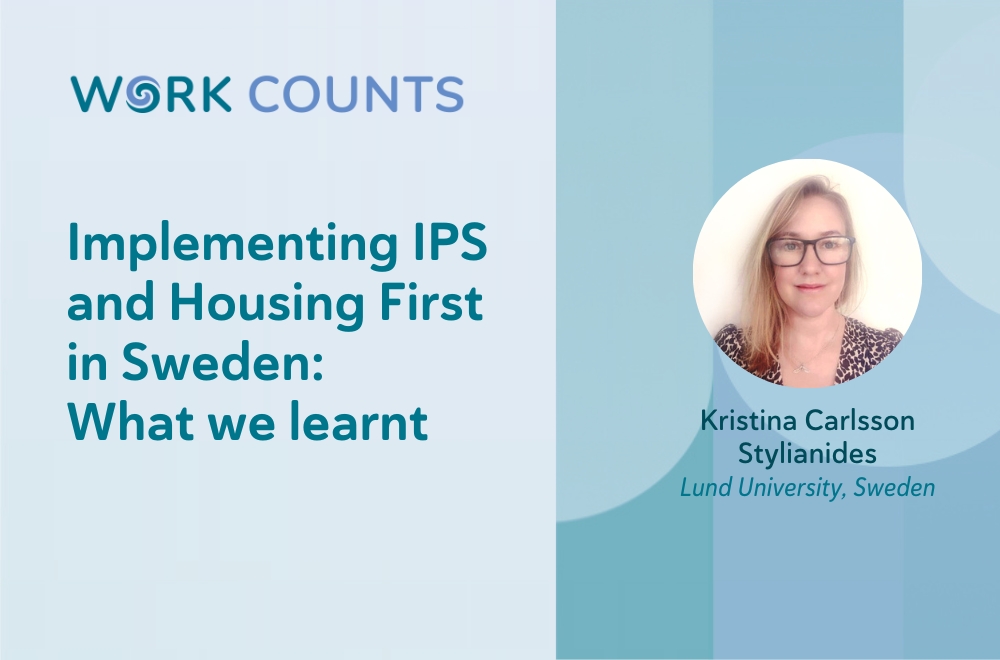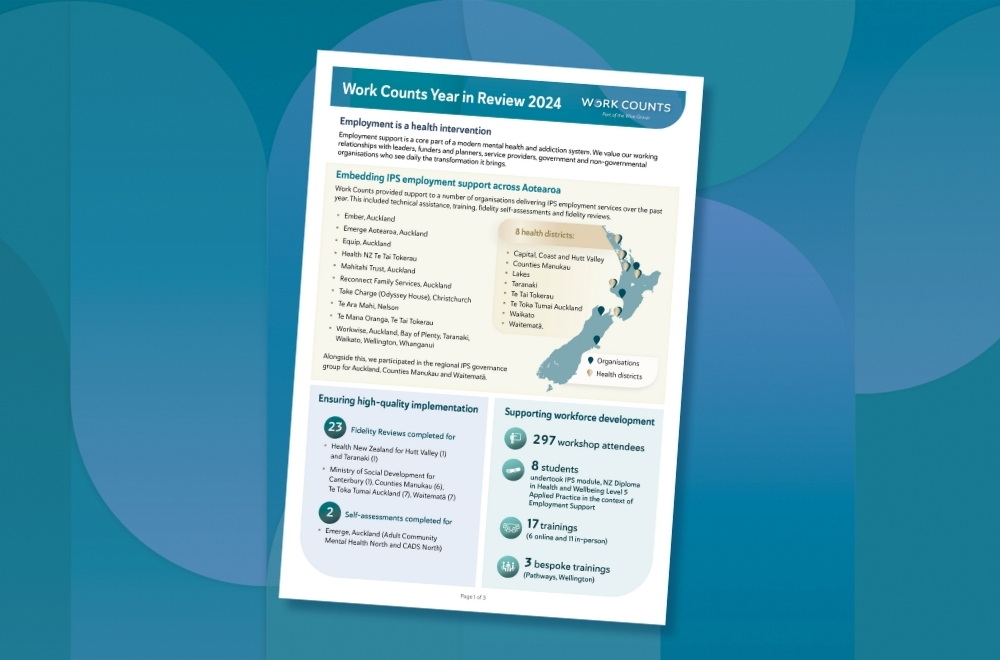The research behind IPS

Published:
January 5, 2020
Library type:
Keywords:
An overview of the research behind the IPS approach
For more than 30 years a dedicated group of researchers and practitioners operating around the world have focused on understanding and improving the evidence underpinning employment support services for people who experience mental health conditions and addiction.
In doing so they have both changed the way employment support practices operate and helped to improve the lives of people worldwide. We are indebted to their vision and leadership.
“If you’re passionate about supporting people back into employment, then I really encourage you to browse [the library] and have a look at some of the things that I’ve been working on but also many people across the world have been bringing together. Here you’ll find the best available evidence on how best to support people back into employment.” – Dr. Helen Lockett
The evidence that IPS works
IPS is the most extensively researched approach to employment support.
Research about IPS started in the mid-1990s, when day treatment programmes were converted to employment support services. By 2008, 11 randomised controlled trials had been completed, enough to conduct a systematic review. A 2008 review established that the success rates of IPS programmes could be replicated across different contexts and countries.
In 2016 a meta-analysis of 17 IPS randomised controlled trials from 10 countries again demonstrated the success of IPS services.
These consistent effects across time, different populations and countries show the robustness of the IPS approach, which has been operating successfully in New Zealand for over 10 years.
Key practices to an effective IPS implementation
One of the reasons IPS has been successfully replicated in different countries is because its key principles and practices have been carefully articulated in an IPS fidelity scale and implementation manual. Both have been continually updated based on practitioner and service user feedback.
The fidelity scale can be used to review services, scoring how well they are following the evidence-based principles and practices. Research has found that total score on the IPS fidelity scale is a robust predictor of service performance.
IPS research in Australasia
IPS has been successfully operating in New Zealand and Australia for some years, with the first randomised controlled trial conducted in Melbourne, Australia in 2005/06. The study found that those who received IPS services were more likely to find a job, work longer and for more hours per week than people who got jobs through the control vocational services.
In 2014, a large-scale study across four Australian sites was published, comparing IPS services with non-integrated disability employment services. The study found that participants in the IPS services were 2.4 times more likely to get a job, however these sites did not reach the expected outcomes that were being achieved in the United States. The findings of this study, and experience of setting up IPS services in the UK and Europe, highlighted the importance of providing implementation support to enhance the quality and effectiveness of IPS services.
The first Australasian pilot of adding in an implementation manager alongside an IPS service was begun in Auckland and Counties Manukau District Health Boards in 2015 in partnership with Workwise, a non-government provider of employment support services.
The pilot found that having implementation support significantly improved the fidelity of IPS services, increased the number of people referred to and accepted onto the programme, improved clinicians’ attitudes towards the employability of people on their caseload and improved the outcomes services were achieving.
IPS research in New Zealand
In New Zealand, there is a strong case to be made for increasing the availability of IPS employment support programmes.
Recent research reports the inequity of access to supported employment services across the country, and that where there are IPS services, there is not enough employment support resource for the number of people who want help to get a job. People in contact with mental health and addiction services actively want to work, yet have very low levels of employment participation – despite IPS practices being known to effectively support people to get and keep a job.
Articles 26 and 27 of the United Nations Convention on the Rights of Persons with Disabilities specifically highlight the inequity of disabled people in relation to employment participation and explicitly call for better access to quality employment support services.
Supporting people who experience mental health conditions and addictions benefits individuals and family/whānau. The costs of providing the supported employment services are easily recouped through the outcomes they obtain.
The OECD Mental Health and Work: New Zealand Report released in December 2018, informs how to increase access to evidence-based practices in mental health and employment in New Zealand.
Updated: December 2023
Citations
Bond, G.R., McHugo, G. J., Becker., D. R Rapp, C. A., & Whitley, R. (2008). Fidelity of Supported Employment: Lessons Learned from the National Evidence-Based Practice Project. Psychiatric Rehabilitation Journal, 31 (4), 300-305. https://psycnet.apa.org/doi/10.2975/31.4.2008.300.305
Perkins, R. and Repper, J. (2019). Growing the availability of evidence based supported employment. Mental Health and Social Inclusion, Vol. 23 No. 4, pp. 145-148. https://doi.org/10.1108/MHSI-11-2019-062
Gary R. Bond, Ph.D., Robert E. Drake, M.D., Ph.D., Jacqueline A. Pogue, M.A. (2019). Expanding Individual Placement and Support to Populations With Conditions and Disorders Other Than Serious Mental Illness. https://doi.org/10.1176/appi.ps.201800464
Kim, S. J., Bond, G. R., Becker, D. R., Swanson, S. J., & Langfitt-Reese, S. (2015). Predictive validity of the individual placement and support fidelity scale (IPS-25): A replication study. Journal of Vocational Rehabilitation, 43(3), 209-216. https://psycnet.apa.org/doi/10.3233/JVR-150770
Bond, G. R., Becker, D. R., Swanson, S. J., & Ellison, M. L. (2023). IPS-Y (IPS Fidelity Scale for Young Adults). Worcester, MA: University of Massachusetts Medical School, Transitions to Adulthood Center for Research and Lebanon, NH: IPS Employment Center, Rockville Institute. Link to tool (from IPS Employment Center).
Waghorn et al., (2014) and Killackey et al., (2008). Royal Australian and New Zealand College of Psychiatrists clinical practice guidelines for the management of schizophrenia and related disorders. Australian & New Zealand Journal of Psychiatry, 50(5), 410-472. Link to guidelines.
Te Pou o te Whakaaro Nui. (2017). Evaluation of IPS implementation manager role. Link to publication.
Lockett, H., Waghorn, G., Kydd, R. & Chant, D. (2016). Predictive validity of evidence-based practices in supported employment: a systematic review and meta-analysis. Mental Health Review Journal, 21(4), 261-281. https://doi.org/10.1108/MHRJ-12-2015-0040
OECD (2018). Mental Health and Work: New Zealand. Mental Health and Work, OECD Publishing, Paris. https://doi.org/10.1787/9789264307315-en
Priest, B. (2018). IPS implementation support in New Zealand (presentation). Work Counts, New Zealand. Link to presentation.


